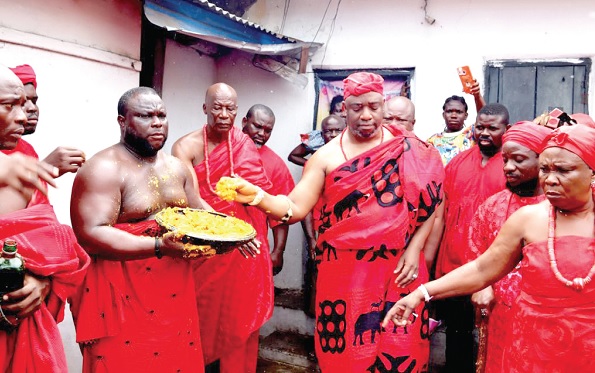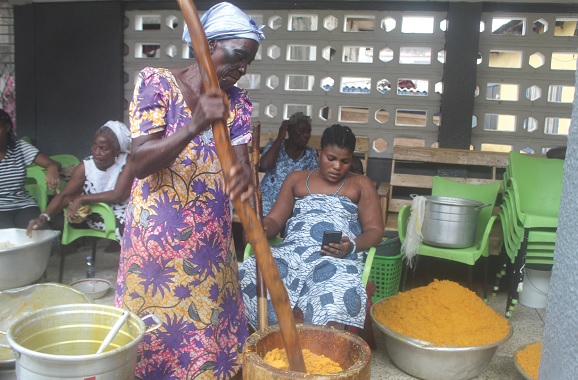
Ga Mashie celebrates Homowo
The rich culture of the Ga Dangme people was in full display last Saturday during the celebration of this year’s Homowo festival.
Although the annual festival was held without the usual funfair because the people were still mourning the death of the Queenmother of the Ga State, Naa Dedei Omaedru III, it was still eventful.
The Ga Mantse, King Tackie Teiko Tsuru II, restricted his sprinkling of the traditional corn meal, ‘’kpokpoi”, to the stool house, near the Ussher Fort.
Accompanied by sub-chiefs and elders, the Ga Mantse later proceeded to the palace at Kaneshie where he sat in state to acknowledge pleasantries.
Advertisement
After the sprinkling of “kpokpoi’’, which is done to mark a bumper harvest, King Teiko Tsuru emphasised the need for Ga Dangmes to unite and forge ahead in peace.
The Ga Mantse, who is also the President of the Ga Traditional Council, said that as a result of their divisiveness, Gas had been denied entitlements due them over the years.

Nii Ayi-Bonte II (middle), Gbese Mantse, dancing after sprinkling ‘Kpokpoi’ to mark the occasion
King Teiko Tsuru further wished the people well during “Odom”, a period of quietness in honour of the late queenmother.
Gbese Mantse
The Gbese Mantse and Adonten of the Ga State, Nii Ayi-Bonte II, also embarked on a procession to perform libation and sprinkle “kpokpoi” to climax the festival.
Nii Ayi-Bonte II was accompanied by his elders, queenmothers and sub-chiefs to perform the customary rites as demanded.
The whole exercise was characterised by singing, drumming, chanting of war songs and musketry.
The precession, which began at about 11a.m, saw the chief leading the group of revellers through the principal streets to the Ussher Fort in James Town, the traditional starting point of the sprinkling of the “kpokpoi”.
It was preceded by some young girls in red wrappers who carried the meal to the sacred site where prayers were offered to the gods and ancestors through libation after which Nii Ayi-Bonte performed the first rite of scooping the palm nut soup and tuna to mix with the “kpokpoi”.
He then gave out a handful of the meal to the elders, dignitaries and people around and led them to sprinkle some of it within the Dutch-built edifice which served as a prison during the colonial era.

Some women preparing ‘Kpokpoi’, the traditional meal for the festival. Picture: ESTHER ADJORKOR ADJEI
From the fort, the sprinkling continued at various traditional and customary hotspots, family houses and principal streets within the chief’s jurisdiction.
Homowo
Homowo is celebrated by the Ga people in the Greater Accra Region to recount their battle with hunger during the migration to their new settlement.
According to native folklore, the Ga people experienced severe famine due to lack of rainfall during their migration to present day Greater Accra Region, resulting in the death of many.
After a series of prayers and meditation with their gods, they sowed maize which yielded a bumper harvest.
They termed the end of their hunger “Homowo”, meaning "hooting at hunger," which they commemorate annually.
It is celebrated by all sects of the Ga State but with slight variations.
Generally, the festival begins in May with the sowing of the maize specifically for the preparation of “kpokpoi’’.
It is followed by a thirty-day ban on noise-making with particular emphasis on drumming, singing, loud music and the like.
This is because they believe noise hampers the maturity of crops during that period.
To climax the festival, traditional rulers and family heads lead processions to sprinkle the “kpokpoi’’ at specific locations such as cemeteries to symbolically nourish the gods and the dead.
This is usually done on a Saturday in August.
Gbese is one of the seven clans which make up the Ga Mashie Traditional Area.
